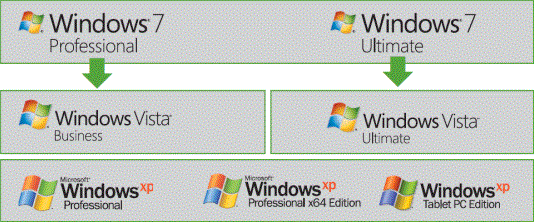In this post we ask two related questions about downgrading.
Can I legally downgrade from Win 7 64 bits to Win 7 32 bits?
and
Winows 7 Professional downgrade rights to Vista and XP
Granted these are quite distinctly different intentions of end results, but they do share a lot of similar ramifications regarding what you are allowed to do within the scope of your Windows licence.
Downgrading 64-bit to 32-bit.
This not actually a real downgrade as it is simply changing the bit-ness of your operating system but people think of it as a downgrade as it is almost a step backwards in terms of compatibility. If you have more than 3GB of memory then you should almost never consider this as an option as, for reasons I have already stated, you will be effectively crippling your computer.
I’m going to start again by using the Microsoft End User License Terms search tool and present in all versions of the EULA is the following section:
2. INSTALLATION AND USE RIGHTS.d. Alternative Versions. The software may include more than one version, such as 32-bit and 64-bit. You may use only one version at one time.
The key word here is “may”; if you were supplied with both 32-bit and 64-bit discs, or can legally acquire them from your computer supplier, then you are fully entitled to use either version so long as you only use one version at a time.
I have seen many machines supplied from manufacturers and know for a fact that some only come with 32-bit reinstall discs, some come with 64-bit reinstall discs and some come with both. Some manufacturers will even supply the necessary discs for a small charge. You may well be stuck with the version that came with your machine which, hopefully, is the right version for you.
An article from ZDNET was kindly linked in Hotei’s answer to the first question: What Microsoft won’t tell you about Windows 7 licensing in which it states
At the time you purchase an OEM copy of Windows 7 to be preinstalled on a new PC, you must choose either 32-bit or 64-bit Windows. Your agreement with the OEM determines whether you can switch to a different version; some PC makers support only a single version with specific PC models and will not allow you to switch from 32-bit to 64-bit (or vice versa) after purchase.
Almost every retail copy of Windows 7 has both versions supplied as it provides the most compatibility for all customers. If you have a retail version then chances are you have both 32 and 64-bit discs and so can use either.
Downgrading to an earlier version
This is something of a thorn in the side for many people who bought early Vista “capable” machines. The machines were somewhat underpowered and struggled with the new media-rich Aero desktop so Microsoft decided to allow certain people to switch back to Windows XP in order to resolve the performance issues. Windows 7 is no different in requiring a good graphics accelerator to look it’s best, but hardware has moved on since Vista and this is much less of an issue now though there are still cases where some people want to move back to an earlier version, either for performance or business software compatibility issues.
Sadly for both Vista and Windows 7 the conditions for being able to downgrade to an earlier version are pretty strict and relate only to the Professional and Ultimate OEM (preinstalled) versions of Windows.
Retail users may be able to call Microsoft and could get lucky in obtaining a licence for Windows XP but Microsoft are under no obligation to give you a licence. The fact that you actually bought a copy of Windows 7 itself implies that you knew whether or not it would work for you and I suspect this is the logic that Microsoft is using here.
The downgrade path is pretty simple for eligible users:
Users have the rather simple choice to downgrade versions to their related previous versions of Vista, Professional to Business and Ultimate to Ultimate, or to any version of Windows XP.
This is only a summary of what you are freely able to do with your Windows 7 licence, if you want to use both Windows XP and Windows 7 (or even Windows 7-32bit and 64-bit) on the machine as a dual-boot option then you’ll need to pay for licences for both versions.
Of course if you have Windows 7 Ultimate or Professional the you have an “XP Mode” that is effectively a licensed copy of Windows XP running in a virtual machine. If you have either of those versions then you should try XP Mode before looking at downgrading as it could save a lot of time and trouble.


Subscribe to comments with RSS.
Comments have been closed for this post